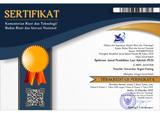Relationship Between Parenting Style and Establishment of Religious Characters at Taman Pendidikan Alquran (TPA) Masjid Alfurqon Desa Sikuliek Kecataman Koto Tangah Kota Padang
 ), Vevi Sunarti(2),
), Vevi Sunarti(2), (1) Universitas Negeri Padang
(2) Universitas Negeri Padang
 Corresponding Author
Corresponding Author
DOI : https://doi.org/10.24036/spektrumpls.v9i2.112400
Full Text:
 Language : en
Language : en
Abstract
This research was motivated by the low religious character of children studying at the Al-Furqon Mosque Education Park (TPA), Sikuliek Village, Koto Tangah District, Padang City. This is most likely due to ineffective and inaccurate parenting parents, which have a negative impact on the child's personality, especially in the development of religious character. Based on this phenomenon, the aim of this study is to describe the parenting parents of the parents in relation to the child, to describe the religious character of the child, and to determine the relationship between the parenting parentsof the parents and the development of the religious character of the child. Correlational quantitative analysis is the term for this form of study. All children who learned the Koran at the Al-Furqon Mosque Education Park were included in this report (TPA). Saturated samples were used as a sampling method. A questionnaire is the data collection method, and a list of statements is the data collection tool. The percentage formula and sperman rho were used in the data analysis technique. The results showed that low parenting parent, low religious character of children and there is a significant relationship between parenting parentswith the formation of children's religious character. Suggestions in this study are that parents are expected to be able to choose and sort out what parenting parents to apply to children, pay more attention to children and become role models for their children because the family environment is very much determined by the formation of children's religious character and the existence of cooperation between parents and administrators TPA to participate in motivating children to continuously attend lessons at the TPA so as to maximize the formation of children's religious character.
Keywords: Parenting Parents, Religious Character
References
Ahmad, T. (2002). Ilmu Pendidikan Dalam Perspektif Islam. PT Remaja Rosdakarya.
Anisah. (2011). Pola Asuh Orang Tua Dan Implikasinya Terhadap Pembentukan Karakter Anak.
Jurnal Pendidikan Universitas Garut, 5(1), 70–84.
Djamarah, Saiful Bahri. (2004). Pola Komunikasi Orang Tua dan Anak dalam Keluarga. Rineka
Cipta.
Gilang Ariesta Guchi, Vevi Sunarti 203
Hubungan antara Pola Asuh Orang Tua dengan Pembentukkan Karakter Religius Anak ….
Djamarah, Syaiful Bahri. (2014). Pola Asuh Orang Tua dan Komunikasi dalam Keluarga. Rineka
Cipta.
Gunarsa, S. (2002). Psikologi Perkembangan Anak dan Remaja. Gunung Mulia.
Hidayah, R. (2009). Psikologi Pengasuhan Anak. Sukses Offset.
Irawati, I. (2009). Mendidik dengan Cinta. Pustaka Inti.
Mardiyah, M. (2017). PERAN ORANG TUA DALAM PENDIDIKAN AGAMA TERHADAP
PEMBENTUKAN KEPRIBADIAN ANAK. Jurnal Kependidikan.
https://doi.org/10.24090/jk.v3i2.902
Marzuki, S. (2012). Pendidikan Nonformal. PT Remaja Rosdakarya.
Maunah, B. (2009). Landasan Pendidikan. Teras.
Narwanti, S. (2011). Pendidikan karakter. Familia.
Neolaka, A. dan, & Neolaka, G. (2017). Landasan Pendidikan : Dasar Pengenalan Diri Sendiri
Menuju Perubahan Hidup. Kencana.
Nisa, H. (2016). KOMUNIKASI YANG EFEKTIF DALAM PENDIDIKAN KARAKTER.
UNIVERSUM. https://doi.org/10.30762/universum.v10i1.223
Purwanto, N. (2006). Psikologi Pendidikan. PT Remaja Rosdakarya.
Rakhmad, J. (2005). Psikologi Komunikasi. PT Remaja Rosdakarya.
Sahlan, A., & Teguh. (2012). Desain Pembelajaran Berbasis Pendidikan Karakter. Ar-Ruzz Media.
Santrock. (2003). Life-Span Development: Perkembangan Masa Hidup. In Erlangga.
Setiawan, D., Rusdi, A., & Putri, V. A. (2018). Peran TPA dalam Penyelenggaraan Pendidikan AlQur’an di Masjid Al-Fattah Palembang. JIP: Jurnal Ilmiah PGMI.
https://doi.org/10.19109/jip.v3i2.1650
Shochib, M. (2000). Pola Asuh Orang Tua dalam Membantu Anak Mengembangkan Disiplin Diri.
Rineka Cipta.
Sriwilujeng, D. (2017). Panduan implementasi penguatan pendidikan karakter. Erlangga.
Sudjana, D. (2015). Pendidikan Luar Sekolah: Falsafah, Dasar Teori, Pendukung Azaz. Fallah
Production.
Sugiyono. (2017). Metode Penelitian Kuantitatif, Kualitatif, dan R&D. Alfabeta.
Ulwan, A. N. (2002). Pendidikan Anak dalam Islam. Pustaka Amani.
Undang-undang RI No. 20, 2003, U. R. N. 20 T. (2003). Undang-Undang Republik Indonesia Nomor
Tahun 2003 Tentang Sistem Pendidikan Nasional Dengan Rahmat Tuhan Yang Maha Esa
Presiden Republik Indonesia. Zitteliana.
Wahy, H. (2012). KELUARGA SEBAGAI BASIS PENDIDIKAN PERTAMA DAN UTAMA.
Jurnal Ilmiah DIDAKTIKA, XII(2), 245–258. http://jurnal.arraniry.ac.id/index.php/didaktika/article/download/451/362
Zubaedi. (2011). Desain Pendidikan Karakter : Konsepsi dan Aplikasinya Dalam Lembaga
Pendidikan. Kencana Prenada Media Goup.
 Article Metrics
Article Metrics
 Abstract Views : 291 times
Abstract Views : 291 times
 PDF Downloaded : 89 times
PDF Downloaded : 89 times
Refbacks
- There are currently no refbacks.

This work is licensed under a Creative Commons Attribution-NonCommercial 4.0 International License.



